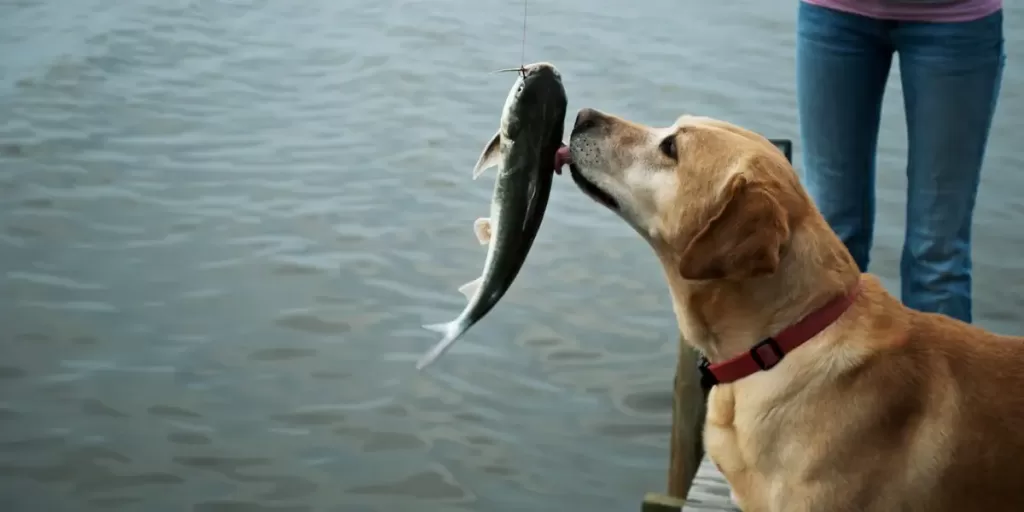Dog Breath Smelling like Fish? If your furry companion has recently picked up a fishy odor, you may wonder why your pup’s breath smells fishy. Whether it’s a new food, a sign of an underlying health condition, or something else, understanding the cause of your pup’s fishy breath is the key to restoring the sweet smell of puppy kisses.
Table of Contents
Read on to learn more about why your dogs breathe smells fishy and what you can do to help.
Reasons for Dog Breath Smelling Like Fish

Fishy-smelling dog breath can indicate a serious dental problem. Abscesses or cavities in the mouth and teeth can cause a fishy odor due to infection or decay. Additionally, foreign objects such as food, sticks, or other debris can become lodged in a dog’s mouth and cause bad breath.
Also Read: Potty Training a Stubborn Puppy | Tips, and Tricks Involved in it.
If left untreated, the infection can spread to other parts of the body and cause further damage. Regular brushing and dental check-ups can help keep your dog’s mouth healthy and prevent bad breath.
If your dog’s breath continues to smell fishy, it’s important to take them to the vet as soon as possible so they can get the proper care they need.
Causes of Fishy Dog Breath
Fishy breath is a very common problem for dogs and one of the most frequently asked questions from pet owners. Although many people assume that fishy odor is caused by their dog eating fish, in reality, it can be caused by a variety of reasons. When it comes to why your dog’s breath smells fishy, there are three main ones. Causes: Poor dental hygiene, food allergies and medical conditions. Let’s take a closer look at each of these potential reasons.
Poor dental hygiene
One of the most common causes of fishy breath in dogs is poor dental hygiene. Dogs, like humans, need regular brushing and flossing of their teeth to prevent plaque and bacteria from building up. If your dog doesn’t get enough oral care, bacteria can build up and cause a fishy odor.
Food allergies
Food allergies can also cause a fishy odor. If your dog is allergic to certain ingredients in the food, their body will react to these ingredients by producing an enzyme called histamine. This histamine causes inflammation in the mouth and throat, leading to a fishy odor.
Medical conditions
Finally, medical conditions can also cause fishy breath in dogs. Certain conditions, such as diabetes and kidney disease, can lead to the accumulation of toxins in the blood. This buildup of toxins produces a fishy odor in a dog’s breath.
If your dog’s breath constantly smells fishy, it’s important to take them to the vet for an exam. A veterinarian can determine the cause of the odor and help you find the best treatment. If the odor is due to poor dental hygiene, they’ll give you tips on how to improve your dog’s oral care routine. If the odor is caused by food allergies or a medical condition, the vet may prescribe medication to address the problem.
Common Symptoms
There are many causes of this fishy odor in dogs and it is important to understand what they are in order to provide the best care for your pet.
Bad breath
The most common cause of bad breath in dogs is halitosis or halitosis. It is caused by bacteria in the mouth and can be very unpleasant. It is important to brush your puppy’s teeth daily and provide dental chews and treats to help prevent bad breath. In some cases, a dental cleaning may be necessary to remove plaque and tartar buildup. If your puppy’s bad breath persists even with regular dental care, you should have their mouth examined by a veterinarian.
Vomiting
Vomiting can also make your puppy’s breath smell fishy. Because vomit contains undigested food, it gives off a fishy smell. If your puppy is vomiting regularly, you should have them examined by a veterinarian to determine the underlying cause.
Diarrhea
Diarrhea can also cause your puppy’s mouth to smell fishy. This is because faeces contain undigested food, which gives off a fishy smell. If your puppy has frequent diarrhea, you should have it checked by a vet to determine the cause.
Other reasons
In some cases, a fishy odor from your puppy’s mouth can be caused by other reasons such as an infection, metabolic disorder, or structural abnormality. It is important to have your puppy examined by a veterinarian to determine the cause of your fishy breath so that appropriate treatment can be provided.
If your puppy’s breath has a fishy odor, it’s important to have them examined by a veterinarian as soon as possible. Identifying the cause of fishy odor is the first step in providing the best care for your puppy.
Diagnosis and Treatment for Dog Breath Smelling like Fish
If you’re wondering why your dog’s breath sometimes smells fishy, you’ve come to the right place!
The truth is, there are a few reasons why your pup’s breath smells fishy. In order to determine why and how to treat it, it is important to understand the underlying causes of fishy breath. Read on to learn more about why your dog’s breath smells fishy and what you can do about it.
Examining your dog
The first step to understanding why your dog’s breath smells fishy is to take a closer look at your canine companion. If your puppy’s breath smells fishy, it could be a sign of an underlying medical condition.
Start by examining your puppy’s mouth and teeth. A healthy dog’s teeth should be white and free of plaque and tartar. If your puppy’s teeth are yellow and covered in plaque, this could be due to poor dental hygiene and a fishy odor.
You should also check your puppy’s gums. Healthy gums should be pink and firm. If your puppy’s gums are swollen, red, or inflamed, it could be a sign of gum disease or another dental problem.
Diagnostic tests
If your puppy’s oral exam shows anything suspicious, it’s important to take your pet to the vet for a thorough examination. A vet will perform some diagnostic tests to determine the underlying cause of fishy breath.
Blood tests, urine tests, and dental x-rays may all be part of the diagnostic process. The vet may also clean your puppy’s mouth to determine what type of bacteria or virus is causing the fishy odor.
Treatment options
Once your veterinarian has determined the cause of fishy breath, it’s time to determine the best course of treatment. If fishy odor is caused by poor dental hygiene, your veterinarian will recommend dental cleanings and regular brushing to prevent plaque and tartar build-up.
If the fishy odor is caused by an underlying medical condition, your veterinarian may prescribe antibiotics or other medications to treat the condition. In some cases, surgery may be necessary to remove an infected tooth or repair a damaged tooth.
Prevention for Dog Breath Smelling like Fish
First, it is important to understand the source of the problem. When it comes to bad breath, it is usually caused by bacteria living in the mouth and on the teeth. These bacteria may be the result of poor dental hygiene, an unhealthy diet, or a medical problem.
Fortunately, there are steps you can take to help keep your pup’s breath smelling fresh.
1. Diet and nutrition
A healthy diet is essential for your puppy’s overall health, including his breathing. Feeding your dog a balanced diet rich in natural ingredients like lean proteins and fresh vegetables is the best way to keep their breath smelling sweet.
A dog food with added vitamins and minerals can also help support healthy teeth and gums. If you’re looking for something extra to help improve your pup’s breath, look for dog food that contains natural ingredients like parsley or dill.
2. Regular teeth cleaning
Just like humans, regular brushing is essential to keep your puppy’s teeth and gums healthy. Brushing your puppy’s teeth at least twice a week can reduce the buildup of bacteria and plaque that can lead to bad breath. This is a great way to get to know and bond with your puppy.
If you’re having trouble getting your puppy into the habit of brushing, you can try using a finger brush or a special dental chew toy.
3. Regular vet visits
Regular check-ups with your vet are vital to keeping your puppy in tip-top shape. This is especially important if your puppy has bad breath, as there may be an underlying medical problem. Your vet can also provide additional advice on how to keep your puppy’s breath smelling sweet.
By following these simple steps, you can help keep your pup’s breath smelling sweet and their teeth and gums healthy. And, of course, regular playtime, hugs and treats are always a great way to show your pup some love and care.
Final Points
In conclusion, there are many possible explanations for why your dog’s breath smells fishy. The most common cause is an infection in their mouth, often caused by bacteria or plaque build-up. Other possible causes are diet, dental diseases and metabolic disorders.
If you’re concerned about your dog’s bad breathe, it’s a good idea to take them to the vet. They can identify the cause of the odor and recommend treatment. In most cases, treating the underlying cause will help eliminate the fishy odor from your dog’s breath.

